This article was first published as Das Boot in Nr. 40, the October 2018 issue of International Sidecar Traveller
It took us almost a week to get packed, after work and in our spare moments. It took longer than that to convince my brother, Andy, and my good friend, Robert, that loading the tipi and two seventeen-foot canoes onto our sidecars to ride up to Disappearing Lake was a good idea.
For my part, I was pretty sure this would work. The aluminum canoe weighed less than the steel sidecar body of my Sputnik. The tipi poles and cargo would bring the weight up, but I had carried heavy loads, even tipi poles, before. I decided to replace the wimpy Sputnik sidecar shock absorber with a much more robust Showa shock and spring from a BMW GS. That should help with the weight. The shock was almost a direct fit for the odd shaped Russian suspension unit; I chased out the top mount with a tap and it threaded right in. The Showa was wider and slightly longer than the OEM shock so I cut off the swingarm stop and one side of the bottom mount to make it fit. Because the shock was longer, my outfit tipped a little more to the left. I decided to leave it that way for the trip. The exaggerated lean-out would ameliorate the pull to the right caused by the excessive loads and the high crowned forest service roads to the lake.
Andy came over Monday and we figured out how to get the canoes on our sidecars. My brother was a little reluctant when I got out the Sawzall (Säbelsäge), but I told him not to worry.
“I’ve got a welder (schweißgerät), Andy. We can always stick it back together.”
The front of his sidecar and the large box which serves as a seat unbolted and were easily removed, but the Coleman canoe was too wide to fit between the struts and Andy’s sidecar wheel. We cut off his passenger grab-rail and put the tipi canvas in a big duffle bag on the deck. This raised the boat up enough we could fit it above the fender.
The canoe was a little wobbly, so Andy knocked together a cradle with some scrap lumber and deck screws. Ratcheting down the tiedown straps secured the canoe to the cradle and the cradle to the deck. The bag with the tipi cover cushioned the floor of the canoe and kept it from deforming.
While Andy was securing his load, I removed the Sputnik body from the chassis and started puzzling out how to fit the tipi poles and the other canoe to my own rig.
The poles were twenty to twenty-four feet long and there were fifteen of them. Arranged butt-first in two roughly even bundles on either edge of the sidecar chassis, they stuck out about five feet beyond the front wheel, trailing way out behind the rear of the bike, tips just inches off the ground. Perfect. I tied them securely to the sidecar frame. The poles formed a cradle which supported the canoe for its entire length. With a piece of foam wedged between the shock and the aluminum hull, it fit on my sidecar leaving just enough room to force my boot down to the foot peg, squeezing between the gunnel and my exhaust pipes. This could work! I used a ratcheting tiedown to snug the canoe down to the sidecar. Looping a line around the poles and over the bow and another around the stern I drew the canoe and the poles toward each other and lashed them tightly together.
Over the next couple of days I packed gear and provisions into the canoe when I got home in the evening and early in the morning before work. A big, bear-proof aluminum box containing the cooking gear and dry goods went in the middle with cots, sleeping pads, axes, and shovels packed in around it. Spare rope, canvas and lighter duffle filled either end. Andy came up Thursday while I was still at work and filled his canoe with ice chests, jugs of fresh water and all the items necessary for a comfortable stay in the wilds.
Robert drove in from Salem Thursday afternoon, arriving about the time I got home, and Russel pulled in aboard his Ural Retro. Russ was riding along with us, providing transport for him aboard his Ural Retro. Robert was grateful for the ride as he hadn’t been looking forward to sitting on top of the canoe all the way to the lake.
“There will be porters?” Rob asked, glancing at the overloaded bikes.
It was 6:30 by the time the party was assembled, everything was packed, and we were ready to go. Sunset would be at 8:30, it was thirty miles to the lake. If nothing fell off, we should have just enough time to get there, launch the boats and find a campsite.
Most of our route would be on lightly traveled rural roads where we could keep our speed down. My only real concern was getting across the Columbia River. The mile long, steel decked bridge is high above the water and the wind was blowing hard at right angles to the crossing.
We had quick huddle before we took off. My brother was regarding his load dubiously.
“Don’t worry, Andy. This will be epic!”
“Yeah. An epic fail,” he muttered.
“We can go up Eastside Road. That will keep us off the highway and drop us right down by the toll bridge. I’ll stop just past Panorama Point, we can check the lashings and decide if this is a good idea. If it seems sketchy, we don’t have to do it. We can come back here and take the truck tomorrow morning, okay?”
Russ chuckled. “It will be an adventure.”
“That’s what I’m afraid of,” Andy replied.
“Andy, if you have any problems, pull off. If I don’t see you back there, I will pull over and wait for Russ to catch up and tell me what’s happening. You ready?”
Andy and Russ gave me a thumbs up.
“Forward!” cried Robert waving his hand in the air like a cavalry officer signaling the troops, and we were off.
We made it to the first stop sign without incident. I looked back and got another thumbs up from my companions before proceeding. The next section had some corners and I was pleasantly surprised; my Triumph went right where I pointed it without wandering or hesitation. If anything, it seemed more planted with the load. We were approaching a long straightaway with the west wind blowing across it at right angles. This would be the first real test. Would the crosswinds try and pivot us, swinging the long canoes around the bikes, forcing us off the road?
The road curved around a barn and onto the flats. The orchards on our left sloped down from the road and did nothing to break the wind. The bike continued straight and true. I edged my speed up to fifty mph. The bike still felt steady.
I could see some tall firs waving wildly in the gusty breeze as we came to the end of the straight, and the road dropped down into the shelter of Whiskey Creek before winding back up into the wind and around the exposed shoulder of Panorama Point. I pulled over at the next wide spot.
We conferred and decided to continue to the lake.
“Aside from the tollbooth down at the bridge, I don’t plan to stop again until we get to Willard, everybody okay with that?”
Robert and Russ nodded. Andy finished snugging up his lashings and said, “At least if we get blown off the bridge, we will have the boats right there.” We laughed, a little uncomfortably.
Descending Eastside Road by way of a series of steep switchbacks, we arrived at the bottom of Highway 35. From there it was a short hop under the freeway, to the drawbridge across the Columbia, where we paused to pay our toll before crossing from Oregon into Washington State. Squinting into the sun, we saw whitecaps rolling up the river between walls of basalt. The cliffs of the gorge were smoky shades of purple-black, looking like they were painted there against a perfectly blue sky. I glanced down through the steel deck at the water churning beneath me. It was like riding across a cheese grater, hundreds of feet above a frigid river while being buffeted by the wind. You don’t get your money’s worth if you don’t look down.
Once safely on the Washington shore we turned west on Highway 14 and rode along the river for a couple of miles before climbing to the top of the cliffs on Cook-Underwood road. A county sheriff flashed by, going the other direction. I checked my mirrors, but he didn’t turn around. We had timed our trip at shift change or perhaps he didn’t care. I’m sure he’s seen stranger things on the road out here.
Unexpectedly, we found the headwinds more difficult to negotiate than crosswinds. The gusts seemed to grab the bow of the canoe, randomly shoving the bike to the left or the right. It took concentration and a measure of brute force to stay in the lane, but it proved manageable. There was no traffic and we kept our speed down. As we left the river and headed into the forest, the wind ceased to be a problem. There were more curves now. My load was riding okay, though I could hear the tips of the tipi poles grinding on the pavement behind me whenever I hit a bump. Watching my brother in the mirror I could see his load was not secure. The big red canoe would shift wildly left or right as he rounded each turn.
When we reached the little village of Willard, I pulled over and we took another look at his lashings. Andy walked around the bike, tugging on the straps, tightening everything up.
“You going to make it?” I asked him. “We’re halfway there, there are still about fifteen miles to go.”
“It should be alright,” he replied. “It looks worse than it is.”
“You don’t want me to go back and get the truck?”
“Naw, let’s just do it.”
And so we did, driving north through the old growth forest. Dogwoods lined the road, white blooms floating ghostlike in the shadows of the tall conifers. We passed Little Huckleberry Road at the bottom of The Big Lava Bed. At Cabbage Creek Road we began to climb. The forest on our left was stunted, growing up through odd-shaped mounds of lava. The late afternoon sun, low in the sky, flashed in our faces like a strobe as we drove through shadows cast by the contorted trees.
We made it another eight or nine miles before my brother had to pull over. The canoe had shifted again. Closer inspection revealed the cradle was collapsing. The screws had pulled out and the legs were folding. The whole thing was slipping off the deck. We wrestled the cradle back in place and added a bow line on either side in an attempt to keep the boat from swinging in the corners. Andy brought another line forward from the stern and rearranged the load in the boat to discourage it from sliding backwards; he moved the ice chest to Russell’s bike. Having done what could be done we soldiered on. We were almost there.
The pavement turned to dirt covered with crushed yellow pumice, pockmarked with craters. The aluminum canoe rattled like a long, narrow snare drum. I lost sight of the bikes behind me in the thick dust kicked up by my bike. When I was unable to avoid a particularly deep pothole my teeth rattled, and the boat rang as my cargo bounced against the hull. I wondered if Andy’s canoe was still tied to his sidecar. It was a relief when I saw the lake through the trees.
We paused briefly to admire the sunset reflecting off the dark, placid water between the mammoth cottonwoods, some three and four feet in diameter. The Forest Service refers to Disappearing Lake as an “occasional feature”. During winter, torrential rains and deep snow covers the high ground. The low spots fill with water, rising up the trunks of the trees. Three weeks ago the roads to here were impassable. In another three weeks the water will have dropped, leaking through the porous bed rock, leaving a few swampy spots and small streams, the last of the snowmelt, trickling through the fresh growth of new grass. By summer it will have dried, leaving a series of meadows, connected by stands of cottonwoods and defined by fingers of rock at the edge of the lava bed. Red winged blackbirds will flit through the tall, green grass as herds of elk graze, hidden in the meandering expanse
It was 8:30. We had twenty minutes before the last of the light faded away. Twenty minutes to launch the boats, paddle across the lake, and find a place to set up camp. No time to waste.
We pulled around the corner to a shallow gravel bank where a large log lay across the road. Robert hopped out of the Ural and Russ took his leave; it would be dark before he got home. We slid the canoes into the water, unloading some cargo to make room for ourselves, and set out without delay. We had to negotiate a maze of deadwood bobbing along the lee shore before crossing this first impoundment to thread our way between the trees to the next finger of the lake.
Finding a spot where we could land was a challenge. The shore was jagged lava, sharp and abrasive. It dropped off
steeply, making it difficult to step from our tippy vessels. Wild hawthorns armed with inch-long thorns provided nothing to hang onto. We rounded a cottonwood snag , splintered by the winter storms. It stood on a little point of rock. On the back side was a water-filled trench, shaped perfectly to accept a canoe. A table-like shelf above this natural berth provided a convenient place to offload our cargo. Once ashore, we thrashed about the forest for a few minutes searching for a suitable place to camp.
We had landed on a narrow finger of vesicular basalt with water on three sides; the edges were overgrown with saskatoon, stunted alder and giant cottonwoods. Fissures and cracks deep as a man, narrow enough in most places to step across, separated the shores from the interior which was flat and covered with tall, thin lodgepole pines. There was no understory, but the deadfall lay scattered like a giant toddler’s pick-up sticks (Mikado spiel) and the ground was dotted with holes and cave openings, some dry, others filled with water. We found an open area not far from our boats, large enough for the tipi, with no overhanging snags which could fall on us.
“Rob, here’s a flashlight- better hang it in the brush at the landing, or we won’t be able to find our way back.”
Leaving Robert to hump our gear up from the landing, my brother and I set off again in the canoes to fetch the rest of our provisions. When we
got to where we parked the bikes we quickly loaded the ice chests and water. Deciding not to set the tipi up in the dark, we left the poles on my bike; we would come back for them in the morning. The light left the sky and the water was placid and black as we ghosted between the trees. I had a headlamp, so I took the lead, picking my way through the flotsam to find the channel which lead back to camp. Andy followed in the dark. Through the tree tops I could see a bright star shining just off the tip of the fingernail moon. We slipped through the cottonwoods and rounded the bend. A little further on the left I could see a beacon shining from shore.
Robert met us at the landing with a gas lantern. We handed off the food and water before scrambling out and hauling our boats up on the bank. It was 10:30 when we finally sat down to eat. Cold sandwiches washed down with beer never tasted better.
We stretched some canvas for a makeshift shelter and spread out our bedrolls. It was midnight by the time I drifted off to sleep.
Waking early, I tried not to disturb my companions. I made some tea and slipped out of camp, following a game trail to the opposite shore to see
the sun rise. Grasping my teacup in both hands to absorb its warmth with my fingers, I watched the dawn reach for me across the lake with a dancing, glittering lance of golden light. It lit up the rock I was sitting on; violet blossoms shone at my feet and birds chirped and twittered in the trees behind me. A swarm of gnats caught the morning sun and formed a sparkling, whirling cloud above the lake. I finished my tea and walked back to camp. Andy was making coffee and Robert was emerging from his bunk.
Once we were all fortified with caffeine, Rob and I took a canoe to retrieve the tipi poles.
By the time we got back Andy had taken down the lean-to and cleared a space for the tipi. I lashed four poles together and we lifted them upright, spreading them out to form a sturdy base to pile the other poles on.
While we got the poles up, Rob gathered wood for a fire and fetched a bucket of water from the sunken grotto behind our camp. We took a break from setting up the tipi and I kindled a fire.
Soon chorizo and eggs were frying in a cast iron skillet over the coals. We relaxed for a few minutes around the fire, eating and
chatting. When the food was gone, we went back to work.
I’d saved out the longest pole. I laid this on the ground and rolled out the canvas cover along its length, positioning it so the butt of the pole was even with the bottom of the canvas; the top of the cover was lashed to the pole near the tip. Gathering the canvas around the pole, we lifted it vertically with the butt resting on the ground. We dropped the top of the pole into the nest of poles where they crossed up top. Then we unfolded the canvas and drew it around the poles, lacing it together up the front using slender, carved pins.
We still needed two poles to fit into the smoke flaps. These flaps (Landeklappen) act as sort of a flue (Schlot). You can control the fire and adjust for changing wind direction by using the poles to move the flaps. The poles I had reserved proved too short. No matter. We were surrounded by lodgepole pine- the tree got its name because the First Nations used it for tipi poles. We cut a pair of slender saplings from a thicket and skinned the bark off, trimming the few branches off flush with the trunk so they would not tear the canvas. We had them peeled and in place in a jiffy. Once the bottom of the canvas was pegged down the tipi was ready to inhabit, and we could turn our attention to more important things. Like beer. And exploring the lake.
We spent the rest of the day drifting between towering cottonwoods and paddling up blind inlets formed by magma which had congealed into strange and fantastical shapes. We found ourselves pushing through brushy shallows, trying to get to the far reaches of the lake, acres of water hidden behind a wall of trees and driftwood northwest of the more accessible impoundments we had already explored.
Andy and I were entangled in a hawthorn bush, but we could hear Robert somewhere ahead of us, forcing his canoe across a mudbank.
“I don’t think I can make it through here.” he said.
“Too shallow?”
“No, I made it through the brush and into deep water, but the wind has piled up a bunch of logs here. I don’t see a way through.”
“I’m getting hungry,” my brother said. “I wonder what time it is?”
I looked at my watch. “It’s 5:30-we have been out here for six hours. Maybe we should head back to camp and fix dinner.”
“Good idea!” Robert replied. “Anyway, I’m out of beer.”
We threaded our way back through the maze and paddled back to camp.
We set up a kitchen outdoors, next to the tipi, with a fire for boiling water and a gas stove for easy cooking. After dinner we washed the dishes and locked things down to keep them safe from critters. Robert found some bear scat not far from camp. Mice and racoons were a more likely problem, but in any case, we didn’t want any visitors pawing through our food.
When the shadows were growing long Andy took a shovel full of coals into the tipi and rekindled the fire. We doused the cook fire and moved inside.
The fire in the tipi kept it cozy and bug-free. I got out the bourbon and vermouth and mixed three Manhattans, topping each drink with a cherry. Ice clinked in our tin cups as we drew our chairs near the flames and sipped our cocktails. The tipi glowed like a Japanese lantern, casting amber light flickering through the pines. It doesn’t get any better than this.
Saturday after breakfast we took to the water again, searching for a passage to the remote end of the lake. A short portage bypassed the logjam we had gotten stuck in the day before, and we found ourselves in a wonderland, with islands dotting acres of open water divided by trees poking up through the shallows. We glided through the watery forest and found a hidden mountain stream cascading into the lake.
Paddling up this brook to the first small waterfall, we turned our vessels around and let the swift current send us back out into the lake. There we rafted up for a lunch of cheese and jerky, washed down with icy gin and tonics. We relaxed on the placid water and soaked up the sun. A pair of buffleheads swam by, bobbing their bulbous black and white heads as they paddled along.
We noticed pollen had formed rings around the tree trunks, marking the high-water line. The lake had dropped about a foot since our arrival Thursday night. When we returned to camp the landing had become too shallow and we had to find a different spot to disembark. We clambered ashore on some recently exposed rocks and dragged the canoes up the hill through the saskatoon bushes.
Sunday was all about packing up. Russell was coming to give Robert a ride out of the mountains. He was meeting us by our bikes at one o’clock. We had a hurried breakfast and started striking camp. We took the tipi down, stuffed the cover in the duffel bag and bundled the poles so they could be rafted back. We loaded our packs and gear into the canoes and slid them down the bank, through the berry bushes into the lake. Traversing the placid waters one last time we unloaded everything next to the road, hauled the boats out and lashed them back on the sidecars. It took the entire morning, but we just about had everything loaded on the bikes when Russ showed up.
Andy led the way back. He must have been confident his load wouldn’t shift, because he set a brisk pace. We hit that rhythm, braking into the corners and accelerating out; I could hear the steady thump of Andy’s big single over the happy burble of my Triumphs twin cylinders. The sun shone through the trees as we sped downhill.
Emerging from the woods to the open bluffs above the Columbia Gorge we faced a headwind. Over the weekend the wind had gathered strength and veered around to the East. It proved a fickle wind, coming from the south when we crossed the bridge and staying in our faces as we took the shortest route home, up Highway 35. I don’t know if the it was because the wind was stronger or we were just going faster, but this last leg was nerve racking. The gusty headwinds would suddenly grab the rigs and try to slam us from side to side. After a couple of scares, we slowed a little and were able to make it back to the house unscathed.
Safely back in my driveway, we had a beer and unloaded the bikes, regaling each other with memories from the weekend, already planning the next excursion. Andy swears he will never take a canoe on his bike again. I’m going to weld up a better cradle to carry the canoe for when he changes his mind. I know he will.
Andy was the first to leave. He had to be ready to work at four and was running out of time. As we were waving him goodbye, Rob turned to me and said, “You can talk your brother into doing just about anything.”
A list of all the madcap adventures I had talked Robert into over the years scrolled through my mind. I looked at him and laughed.
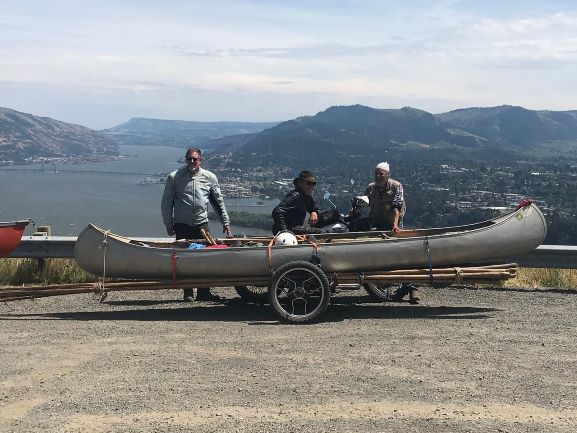

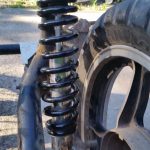
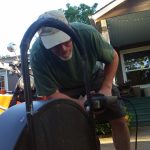
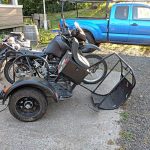
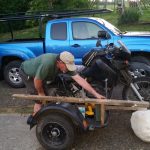
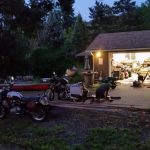
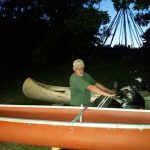
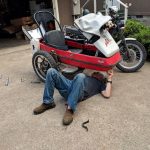
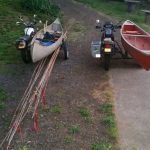
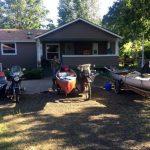
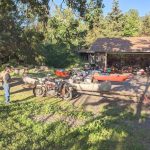
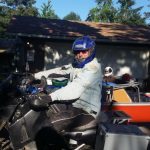
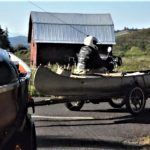
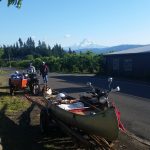
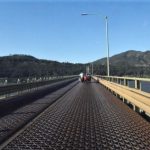
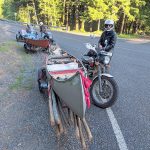
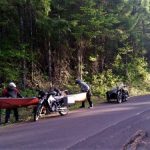
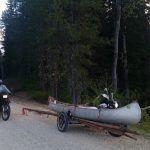
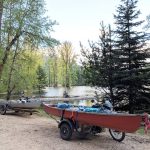
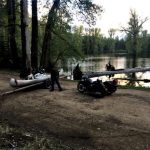
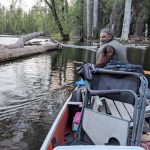
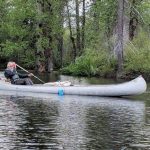
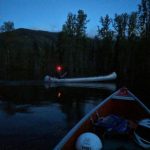
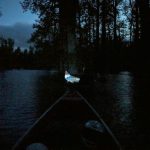
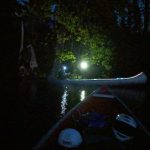
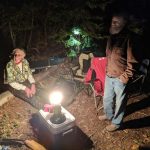
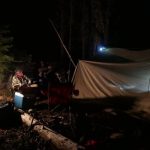
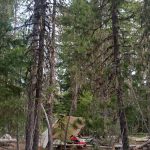
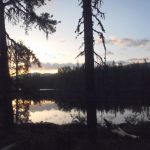
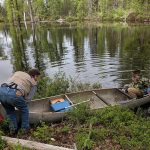
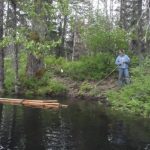
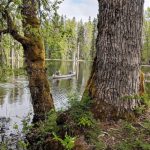
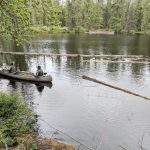
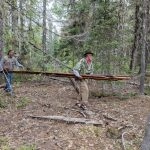
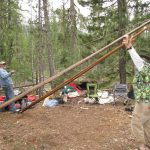
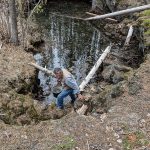
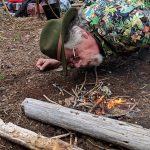
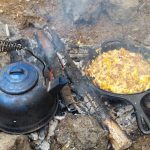
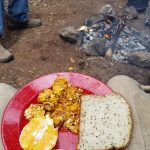
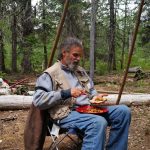
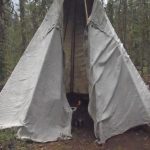
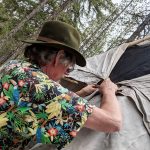
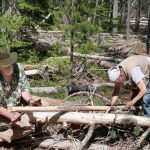
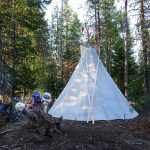
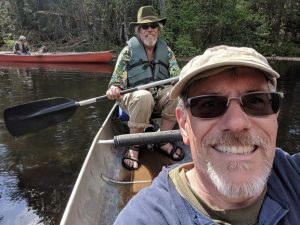
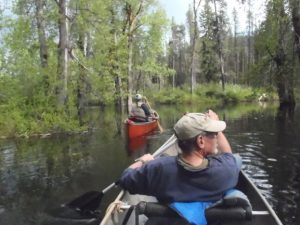
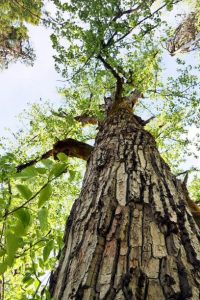
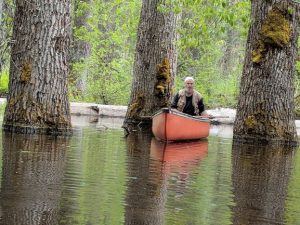
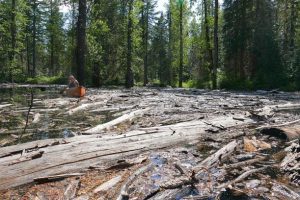
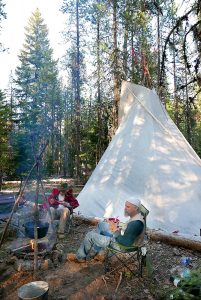
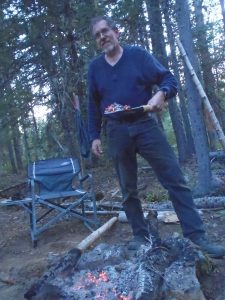
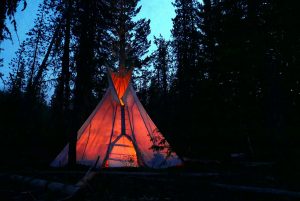
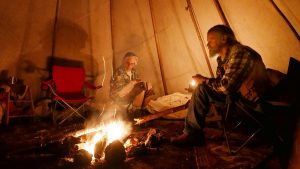
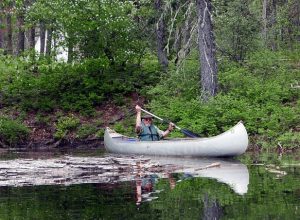
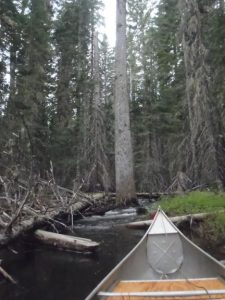
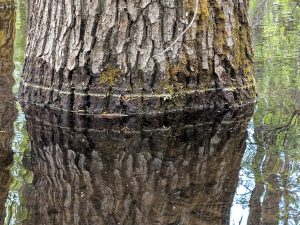
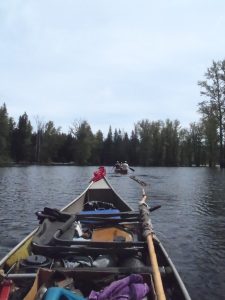
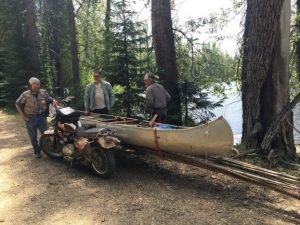
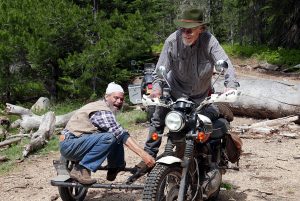
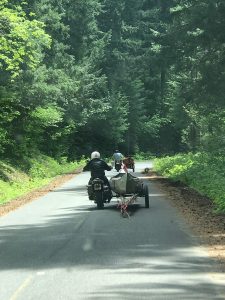
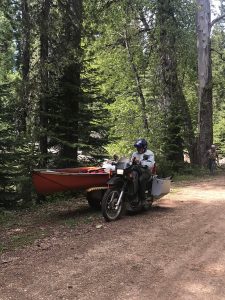
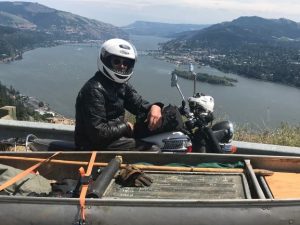
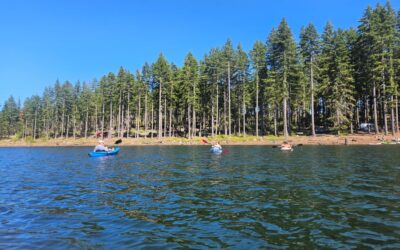
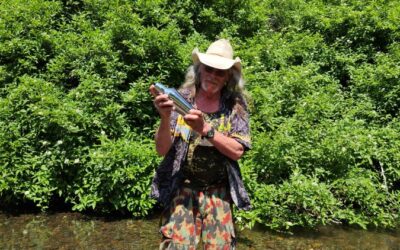
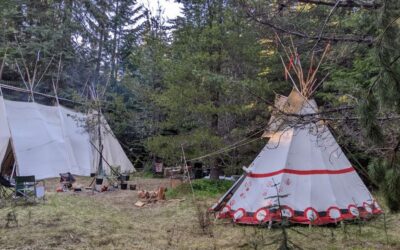
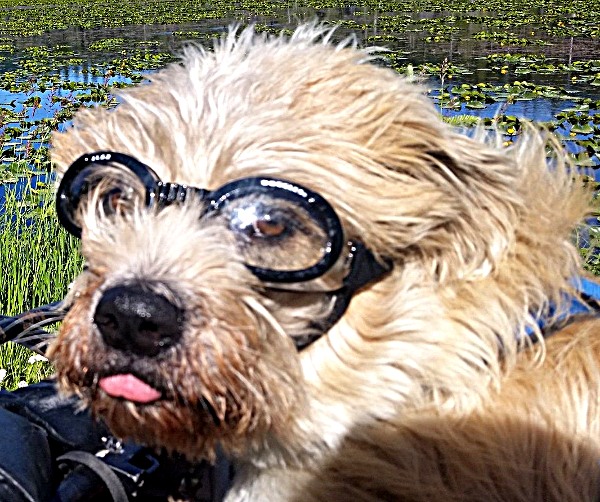
0 Comments